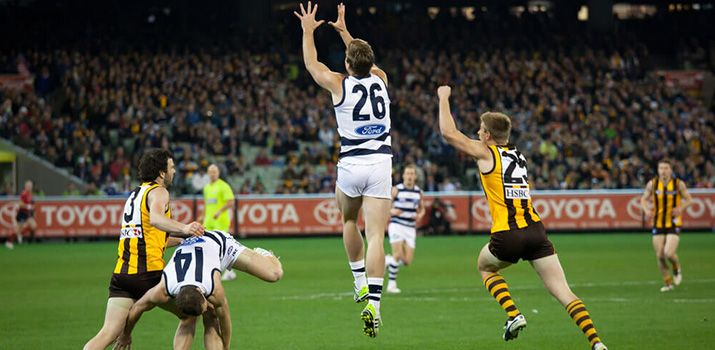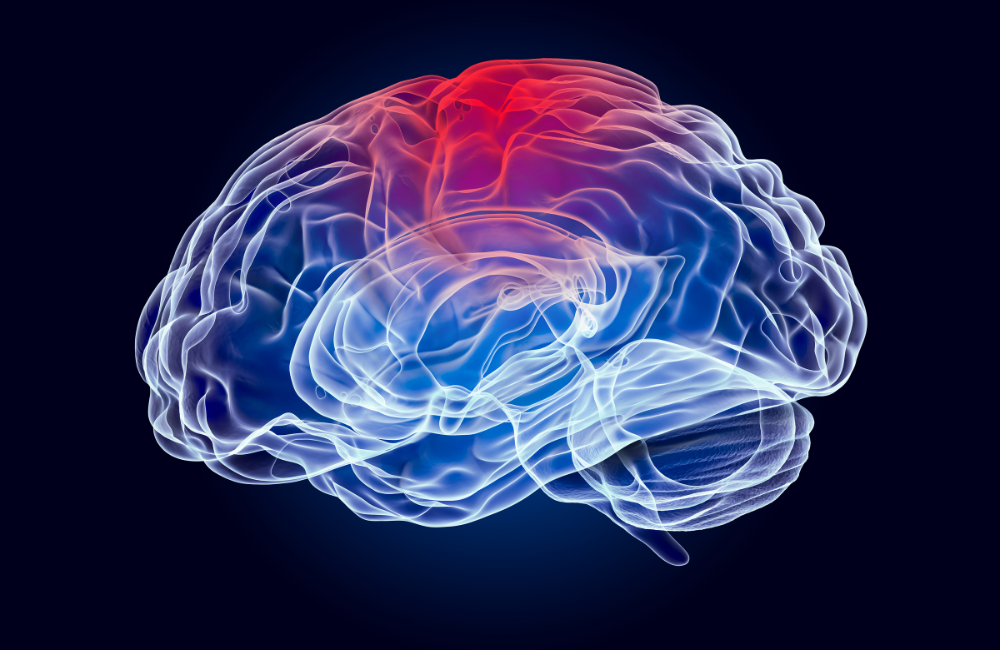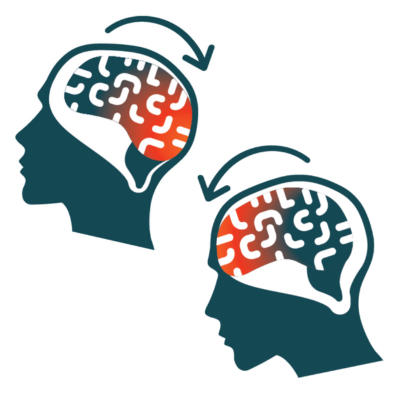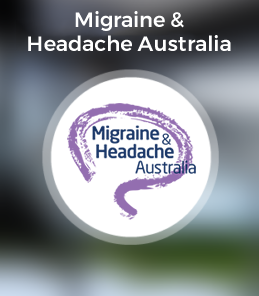(See also Acquired Brain Injury)
Concussion is a common type of mild traumatic brain injury that occurs when the brain is shaken or jolted inside the skull. This can be caused by a direct or indirect force, from a blow to the head or body during contact sports, falls, or motor vehicle accidents.
For years, concussions were seen as mild injuries that healed quickly. However, research now shows that concussions are serious, and can vary significantly in severity and longevity of symptoms. There is now concern about potential long-term complications from accumulated subconcussions, or forces without the generation of symptoms, and ongoing microscopic brain injury. Many Australian sports codes such as AFL and rugby are now changing their guidelines in response to these findings.
Click the headings below to jump to a specific section.
- What is a concussion?
- Symptoms
- Causes
- When to see a doctor
- Diagnosis
- Treatment of concussion
- Prevention
- Complications & long-term effects
- Prognosis
- Recent concussion research
- Further information & support
Medically reviewed by Dr Rowena Mobbs. Last updated September 20, 2023.
What is a concussion?
A concussion is a type of mild traumatic brain injury (mTBI) that can occur when the head or body experiences a sudden impact or jolt. It is a common sporting injury, particularly in body contact sports (e.g. football, boxing), and recreational activities where falls are common, such as horse riding, cycling, skiing and diving.
The impact causes brain strain with resultant inflammation, damage to neurons, and a change in your metabolic state. Your brain suddenly releases neurotransmitters that can either overstimulate or inhibit brain function, and there may be microscopic bleeding with a loss of brain cells.
Concussion was once believed to be a minor injury that does not cause ongoing complications. However, new research has found that 20-50% of patients report persistent side effects beyond one month. Repeated subconcussion is also linked to neurodegenerative disease later in life, a condition known as CTE or chronic traumatic encephalopathy.
What is a subconcussion?
A subconcussion refers to head injuries that do not result in the clinical symptoms of a concussion but can carry less, equal or greater force than a concussion (6,7). These injuries are quite commonplace. Some examples in sport include heading a ball in soccer, tackling related head impact or shaking, or a fall and bump to the head.
Individually, these injuries seem minor because the person won’t show any noticeable symptoms. However, repeated subconcussions can compound over time and cause cumulative injury to the brain.
Symptoms
Symptoms of a concussion can vary widely. Contrary to popular belief, you don’t need to completely lose consciousness to have a concussion – although this does occur in some cases. Symptoms usually present immediately or in the first few hours after the injury.
Common symptoms include:
- Headache or pressure in the head
- Dizziness or balance problems
- Nausea or vomiting
- Sensitivity to light or noise
- Confusion or memory problems
- Fatigue or drowsiness
- Blurred vision or ringing in the ears
- Mood changes, such as irritability, anxiety, or depression
Sometimes people do not realise they have a concussion, or a sports player might dismiss their symptoms because they don’t want to let down the team. If you witness a head injury, look out for the ‘Big 5’ to help you identify someone with a possible concussion.
- Slump – lying motionless, unconscious or knocked out.
- Sway – appearing wobbly, unsteady or falling over.
- Slow – walking slowly, wandering or delayed movements.
- Stun – confused, appearing stunned or behaving unusually.
- Slur – slurred speech, slow speech, or responding poorly.
It is vital to be aware of the Red Flag signs that can indicate a more severe brain injury with potentially fatal consequences. If you see the following signs, it is important to seek emergency care:
- Neck pain or tenderness
- Seizure or convulsion
- Double vision
- Loss of consciousness
- Weakness or burning / tingling in more than one arm or in the legs
- Deteriorating conscious state
- Vomiting
- Severe or increasing headache
- Increasingly restless, agitated or combative
- GCS < 15
- Visible deformity of the skull
Some causes of concussion include:
- Sports injuries: a blow to the head, falling over, colliding with another player or object.
- Falls: this is especially common in older adults or young children.
- Car accidents: head hitting the steering wheel, dashboard, or window.
- Violence (including domestic violence): any head injuries from a fight or assault could also cause concussion. If you or someone you know has experienced domestic abuse, call 1800 RESPECT (1800 737 732).
- Blast injury or other occupational hazards.
When to see a doctor
It is important to seek medical attention if you suspect that you or someone else has a concussion. A concussion is only referred to as ‘mild’ because it is not usually life-threatening – but it can still have serious implications or long-term effects.
A doctor can evaluate the symptoms and determine the severity of the concussion. If it is severe or the doctor suspects that there might be a more serious injury (i.e. bleeding in the brain), the person may need to be hospitalised for further observation and treatment.
Remember the Red Flag signs (which are listed under the symptoms section). If the person displays any of these symptoms, go to your nearest emergency department or call 000. These could indicate a more severe brain injury which is a medical emergency.
Diagnosis
There is no single test to diagnose concussion and ongoing observation is vital. A doctor will evaluate the person’s symptoms and perform a physical examination. They sometimes ask a witness what happened during the injury, especially if the patient is finding it hard to think or remember things clearly.
Brain imaging is often not performed. If concern over more significant injury, doctors may order imaging tests such as a CT scan or an MRI to ensure there is no bleeding or swelling in the brain. These scans are typically only used to rule out other injuries, rather than to diagnose concussion.

Treatment of concussion
Treatment options depend on the severity of the concussion. There is no direct ‘cure’ for concussion but symptoms can be well managed. Once the person has seen a doctor to rule out more serious injuries, most people can recover safely at home under continued observation and a plan for graded recovery, including further review by your doctor.
Physical and mental rest is essential for the brain to heal, especially in the first 24-48 hours but gentle activity is now encouraged (1). You can gradually re-introduce physical and mental activities depending on your symptoms.
Treatment guidelines
| Recovery stage | Activity level |
|---|---|
| Initial post-concussion recovery | Seek medical review. Limit screen time (bright lights and noises can worsen concussion). Do not drink alcohol. Do not drive. Take time off work or study. Gentle exercise such as walking. Avoid any other activities that require high mental concentration (i.e. video games, watching TV, reading, texting) if they cause symptoms to worsen. |
| Light activity | Return to study e.g. work or school using a graded approach Re-introduce exercise activities, such as stationary cycling, as long as they don’t worsen symptoms. Do not participate in any activities that could cause another head injury. |
| Moderate activity | Return to most exercise and study activities but continue to monitor symptoms closely. Do not participate in any activities that could cause another head injury. |
| Full recovery | After being cleared by a doctor, you can return to your usual schedule for sport, work and/or school. Contact sports should only be resumed 14 days after the resolution of all symptoms. |
The duration of each stage depends on the severity of the injury and your symptoms. Recovery can be different for everyone – there are no direct pharmaceutical medications for concussion at this stage, so treatment consists of symptom management e.g. simple analgesia and rest until your symptoms subside naturally (2).
If your symptoms get worse in the first few weeks of recovery, or you are concerned, see your doctor. If symptoms persist beyond one month, consider specialist or multidisciplinary care.
Prevention
Head injuries can’t always be prevented, but there are a few things you can do to reduce your risk.
- Follow the rules of your sport. Many sports have banned certain tackles or developed techniques and rules to reduce head injuries.
- Reduce the risk of falls. Keep your floor free of tripping hazards and install stair gates if you have young children and consider other environmental hazards.
- Wear a seatbelt when driving.
- Exercise regularly to strengthen your leg and core muscles to improve your balance. You may consider working with a physiotherapist or exercise physiologist.
- Take plenty of time to recover from injuries. Your brain health is your priority.
- Wearing a helmet does not prevent concussion but it can prevent more serious brain injury. This is important in sports and other recreational activities like motorcycling, equestrian, bicycling, skiing, etc. Make sure all protective gear fits properly and is worn correctly.
Complications & long-term effects
Many people recover from concussion within one month, however some go on to develop what is known as persistent postconcussion symptoms (PPCS).
The neurological damage caused by concussion is the result of the impact forces (i.e. the physical injury), followed by a delayed neuroimmune response that can last hours, days, and even months after the injury (2). Immune signalling proteins called ‘cytokines’ are released at the site of the injury as well as adjacent areas of the brain. Research suggests that this delayed neuroinflammatory response can be more damaging than the initial impact itself (2).
Overall, this can lead to complications such as:
- Post-concussion syndrome (PCS). In some cases, concussion symptoms continue for weeks or even months. This happens in around 20-50% of cases (3). Headache is the most common symptom, along with a range of physical, cognitive & behavioural changes.
- Second impact syndrome. If a person sustains a second concussion before fully recovering from the first, particularly within 2 weeks, it can lead to a rare but serious condition called second impact syndrome. This can cause rapid and severe brain swelling, which can be life-threatening.
- Post-traumatic epilepsy. In some cases, a concussion can cause changes in the brain that increase the risk of seizures. Post-traumatic epilepsy accounts for 20% of symptomatic epilepsy in the general population (5).

Long-term effects
There is growing evidence that repeated subconcussions can have long-term effects on brain function and health. Some potential long-term effects of subconcussions include:
- Chronic traumatic encephalopathy (CTE). CTE is a degenerative brain disease that is associated with repeated head trauma, including concussions. Symptoms of CTE can include memory loss, confusion, depression, and dementia (6).
- Cognitive impairment. Repeated concussions may increase the risk of cognitive impairment later in life, including problems with memory, attention, and executive function.
- Mood disorders. There is some evidence that repeated concussions may increase the risk of mood disorders, such as depression and anxiety (4).
It is important to note that not everyone who experiences a prolonged period of subconcussions, often over 10 or more years, will develop long-term effects or complications.
Recent concussion research
Concussion research funded by the Brain Foundation:
- Dr George Opie, 2022 – How Do Changes In Brain Rhythms Contribute To The Effects Of Brain Injury?
- Dr Jamie Beros, 2022 – Using Light Stimulation To Improve Recovery Following Traumatic Brain Injury
- Dr Remika Mito, 2021 – Detecting Concussion In The Brain
- Dr Claire Shepherd, 2019 – Chronic Traumatic Encephalopathy
- Dr Amar Abdullah, 2019 – Limiting The Damage In TBI
- Dr Kartik Iyer, 2018 – Assessing Brain Based Recovery In Children With Concussion Following Brain Stimulation
- Dr Jana Vukovic, 2018 – Blocking ROCK2 To Improve Recovery From Brain Injury
Access a full list of recent Australian concussion research via the PubMed database >
Further information & support
If you would like to learn more about concussion, here are some further resources from our website:
- Downloadable fact sheet – a brief A4 fact sheet that covers the symptoms, causes, treatment and outlook for concussion.
- Researcher essays – a collection of essays about brain disorders, diseases and injuries.
- Concussion Interview – Brett Kearney (retired NRL star) interviewed Dr Rowena Mobbs (leading concussion & CTE researcher) about concussion as part of Migraine & Headache Awareness Week 2023.
- Concussion and the Brain – Dr George Opie (video from Brain Awareness Week 2023).
- What is Traumatic Brain Injury? – Dr Jamie Beros (video from Brain Awareness Week 2023).
- Detecting Brain Changes After Concussion – Dr Remika Mito (video from Brain Awareness Week 2022).
Other resources
These organisations provide further information and support for concussion and brain injury. You may find these resources helpful if you are struggling with symptoms or ongoing complications after a head injury.
Concussion in Sport Australia
Australian Sports Commission
concussioninsport.gov.au
Brain Injury Australia
PO Box 220, Marrickville NSW 1475
Tel 1800 BRAIN1
Email admin@braininjuryaustralia.org.au
braininjuryaustralia.org.au
Synapse – Australia’s Brain Injury Organisation
Address: Level 1/262 Montague Road, West End QLD 4101
Mail: PO Box 3356, South Brisbane QLD 4101
Tel 1800 673 074
Email info@synapse.org.au
synapse.org.au
Brain Injury Association of Tasmania
83 Melville Street, Hobart, TAS 7000
PO Box 4580, Bathurst Street PO, Hobart, TAS 7000
Tel: 03 6230 9800
Email enquiries@biat.org.au
www.biat.org.au
National Assistance Card
1 Liverpool Street, Hobart, TAS 7000
PO Box 4580, Bathurst Street PO, Hobart, TAS 7000
Tel: 1300 242 827
Email info@nationalassistancecard.com.au
https://www.nationalassistancecard.com.au/
Connectivity
Sarich Neuroscience Research Institute, 3/8 Verdun St, Nedlands, WA 6009
Tel: 0480 496 267
Email: connect@connectivity.org.au
https://www.connectivity.org.au/
Centers for Disease Control and Prevention (USA)
cdc.gov/TraumaticBrainInjury/index.html
References:
- K J Schneider, 2017, Rest and treatment/rehabilitation following sport-related concussion: a systematic review. DOI: 10.1136/bjsports-2016-097475
- Z Patterson & M Holahan, 2012, Understanding the neuroinflammatory response following concussion to develop treatment strategies. DOI: 10.3389/fncel.2012.00058
- R E Woodrow et al, 2023, Acute thalamic connectivity precedes chronic post-concussive symptoms in mild traumatic brain injury. DOI: 10.1093/brain/awad056
- D K Broshek, 2014, A review of post-concussion syndrome and psychological factors associated with concussion. DOI: 10.3109/02699052.2014.974674
- A Agrawal et al, 2006, Post-traumatic epilepsy: An overview. DOI: 10.1016/j.clineuro.2005.09.001
- D H Daneshvar, 2023, Leveraging football accelerometer data to quantify associations between repetitive head impacts and chronic traumatic encephalopathy in males. DOI: 10.1038/s41467-023-39183-0
- E Dioso et al, 2022, Subconcussion, Concussion, and Cognitive Decline: The Impact of Sports Related Collisions. DOI: 10.52916/jmrs224081
DISCLAIMER: The information provided is designed to support, not replace, the relationship that exists between a patient / site visitor and his / her existing health care professionals.







 The Brain Foundation is the largest, independent funder of brain and spinal injury research in Australia. We believe research is the pathway to recovery.
The Brain Foundation is the largest, independent funder of brain and spinal injury research in Australia. We believe research is the pathway to recovery.